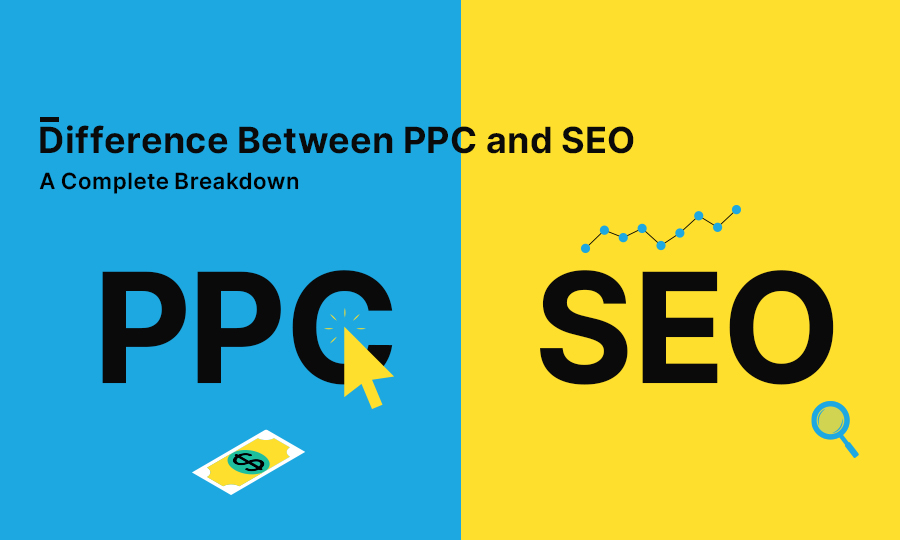Establishing a business in today’s world does not need an intellectual mind. All it needs is the right strategy. However, many businesses in the world of digital marketing stay perplexed about whether to invest in Search Engine Optimization (SEO) or Pay-Per-Click (PPC) advertising. Well, you can hardly ignore the relevance of making an online appearance as per the current scenario. The reason is clear and simple. If you are online, you are there; if you are offline, it’s time to wake up!
With a strong online presence, you get massive exposure. People get to know you globally, and you hardly take time to be the known face.
Here comes the prime reason behind implementing these digital marketing strategies into a business to prosper. However, it is essential for one to know the difference before execution.
PPC is Pay Per Click, an online marketing technique that draws traffic from paid search results. On the other hand, SEO is Search Engine Optimization, an effective technique to optimize a website and rank it in search engines. It deals with organic search results in contrary to what PPC does.
The former aims at attracting traffic from organic search results while the latter does the same from paid ones. However, this explains the basic difference, and the rest will be covered in detail going forward.
Search Engine Optimization (SEO) – Decoding the Basics
Search Engine Optimization (SEO) is the process of improving a website by enhancing its visibility in popular search engines like Google and others.
SEO aims to draw unpaid or organic traffic from search engines. It does by adding more relevance to the website by means of specific keywords.
How SEO Works?
SEO works by applying strategies like keyword research, on-page optimization, off-page optimization, and technical SEO. In fact, search engines utilize both organic and paid results depending on dynamic algorithms.
Furthermore, Search Engine Optimization makes good use of internal and external links along with keywords and optimized content to lend a website strong visibility. In this field, experts keep changing their tactics as per the evolving updates. In this way, SEO works towards making a website crawl up and gain visibility among people.
Types of SEO
SEO involves a vast process that takes into consideration several strategies. These strategies actually indicate the different types of SEO in the digital world.
Let’s have a look at these different types of SEO:
- On-Page SEO
On-page optimization aims at enhancing web pages individually. The purpose here is to achieve higher ranks and draw targeted traffic in search engines. Here, meta tags, keywords, header tags, etc. are optimized with the objective to hold relevance to the target keywords. Moreover, it intends to improve user experience through enhancing page speed, mobile-friendliness, and internal linking structure.
- Off-Page SEO
Off-page optimization simply describes a set of activities conducted outside your website. The objective here is to rank it higher in search engines and lend credibility. This process aims at taking high-quality backlinks from popular websites. This signals the search engines about how valuable your website is. Among the off-page optimization strategies, there is guest blogging, social media marketing, and more to help your website achieve online reputation.
- Technical SEO
Technical SEO is the process to optimize a website’s technical aspects. The objective here is to enhance its visibility and rank it in search engine results pages. This is to ensure that the search engines are able to crawl and index the site. For this, certain tasks have to be completed like site speed improvement, mobile-friendliness, site map enhancement etc. Technical SEO even deals with URL structure optimization, correcting broken links, and more.
- Keyword Research
Keyword research refers to an analysis of specific terms through which people enter into search engines. It is one of the most impactful marketing efforts to give your business massive exposure. Precisely, this step involves looking for popular keywords relating to your business. In this process, several tools are used to find out those valuable keywords. On knowing what terms the target audience is looking for, the website content has to be optimized for alluring quality traffic to your site.
In today’s world, the percentage of people conducting thorough research before shaking hands with companies is huge. So, if you are not in this percentage, it will take a hell lot of time for people to find you. Once you are found, the traffic volume will go high with a wink of an eye.
This is where the need for professional assistance comes in. It is indeed a challenge to crawl up the search engine results pages and stand on top. Just what you need is bagging the best SEO techniques in place with their help, and things are bound to go smoothly.
Unlocking the Benefits of SEO
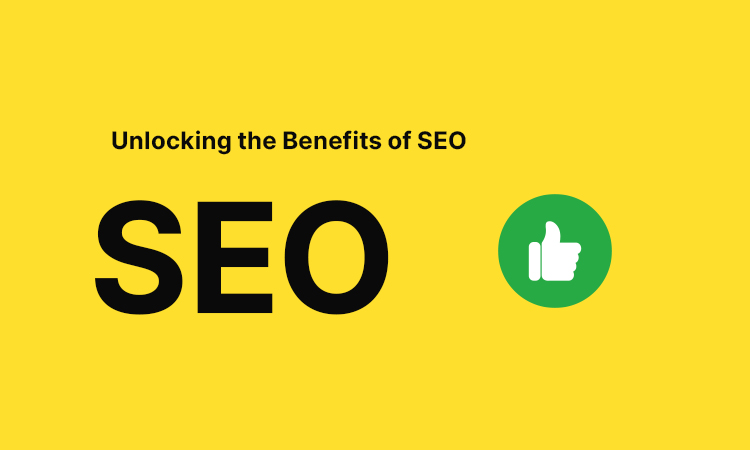
As Google continues to be the most popular search engine, it accounts for over 90% of the total traffic.
Besides, more than 60% of marketing experts have opined that the biggest key to achieving online visibility is Search Engine Optimization.
Where a lot has been said about SEO and its timely implementation, let’s chalk out the benefits this time. Anyone prior to hiring experts in this field must be aware of the advantages of bringing SEO into action.
- Cost-Effectiveness
There is no doubt that SEO is cost-effective. It aims at drawing organic traffic, and this does not invite a cost per click. It’s not paid advertising afterall. Instead, if you can invest in SEO, your business will attain long-term visibility. Also, there will be steady traffic growth with no big expenditure. However, minimal expenses will be there at the initial stage during website optimization and content creation. Despite this, these expenses are negligible and never burn a hole in your pocket.
- Long-term Benefits
SEO lays a strong foundation for traffic growth and online visibility with the intention to provide long-term benefits. If your website is rightly optimized and has good search engine rankings, it would allure organic traffic without taking help of paid advertising. This not only helps in attracting targeted audiences constantly but also builds trust over time. Moreover, the search engines will continue favoring your site if there is quality content. This would help to grow your business and fetch considerable revenues.
- Higher Click-through Rates
One of the biggest benefits SEO brings to businesses is higher CTR or Click-through Rates. It is a natural tendency among users to click on organic search results rather than paid ads. Since the organic search results stand in relevance to their queries, people tend to click more on these. Gaining a top position in organic search results through effective SEO can help any business attract a larger share of relevant search clicks. This results in getting maximum traffic to the website and increases chances for engaging customers.
- Trust and Credibility
SEO plays a very important role in making a website genuine and more credible. It lets the website secure superior rankings in organic search pages. Users take this as more reliable in comparison to paid listings. Your objective will be to ensure your website stays consistently at the top of search engine result pages. This would give visitors a good impression about your website in terms of popularity and genuineness. Trust and credibility will certainly pull more traffic and foster customer loyalty as well.
Knowing the Drawbacks of SEO
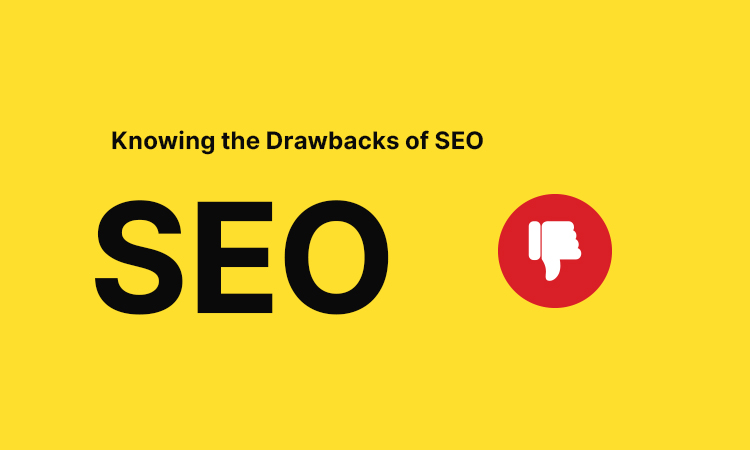
Everything has its pros and cons, and so is SEO. However, the list of cons is not long as this digital marketing strategy is not that harmful. Despite this, it has a handful of pitfalls that one should know before utilizing it for his business.
So, here are a few drawbacks SEO unfortunately brings along:
- Long Waiting Time for Proper Results
Some results never come in a fortnight. Such is the world of SEO where one has no choice but to wait for a few months to expect better results. No matter how good your content is, Google takes a decent time to index it. There is no specific day, time or week when your content will rank with this marketing strategy. SEO is a long-term process and involves multiple activities. So, if you expect to see your website ranking higher within a short timespan with SEO, change your mindset!
- Complex Algorithms
One significant disadvantage of SEO is the complexity and frequent updates of search engine algorithms, which can make it challenging to maintain consistent rankings. Search engines like Google constantly refine their algorithms to improve the quality of search results. These changes can drastically impact a website’s visibility. This complexity with algorithms can be unpleasant for small businesses as well as those without dedicated SEO resources.
- Constant Updates
One big disadvantage of SEO is getting constant updates. For regular monitoring and constant changes to improve search engine rankings, updates keep coming. The algorithms keep changing in search engines to enhance the quality of search results quality. The small-scale businesses may not handle the consequences of changing algorithms as these run in small budgets. Furthermore, these companies might not stay updated with the current trends.
- Competitive Market
One drawback of SEO in this highly competitive market is staying in fierce competition for top rankings. This competition is especially for popular keywords. Big companies with abundant resources have the ability to invest in content creation, SEO strategies, link acquisition, and more. This is where small-scale businesses will find it difficult to compete. In other words, the more the competition, the more challenging it is for the smaller organizations to survive.
When Should You Incorporate SEO?
When you kick off with millions of dreams about magnifying a business idea, you keep looking for the most effective approaches. Initially, your mind stays limited to certain strategies. But when you make up your mind to give your business a brand identity and global recognition, you knock the doors of SEO.
The reason behind incorporation and investment in SEO is enhancing the probability of finding your target audience. The majority of marketers today consider SEO as the most inbound marketing factor for any business.
Usually, there are several instances when you actually feel the need of injecting SEO into your business:
- Having a Minimal Marketing Budget
Your marketing budget may be low, but that’s fine! No one is a millionaire while starting a business. So, this is when you bring SEO into action as a cost-effective approach.
- Building a Brand Authority
Making your business a brand is not something you can do in a week. It takes months, and that’s normal. So, when you decide to work on brand awareness for your business, SEO makes your job easier.
- Increasing Long-term ROI
Incorporating timely and proper SEO tools and SEO strategies propel your chances for a long-term ROI. When you hire experts, they take smart strategies like local listing optimization, long-tail keyword research, mobile-friendly website maintenance, and quality content creation. These factors create probabilities for lifelong ROI.
- Creating Impactful Content
A good website must have good content. Without these, it would never materialize and seize people’s attention. So, when your website looks drab with a handful of images, it’s time to get some top-class content for good search results. Incorporating relevant write-ups into every web page brings vivacity to a website.
PPC – Understanding the Fundamentals
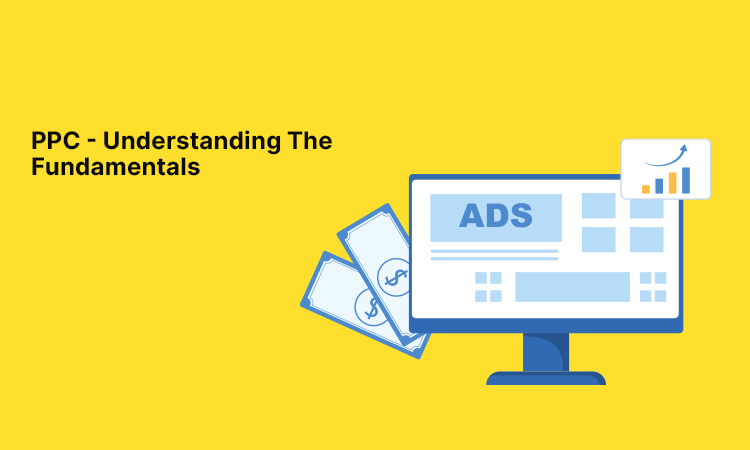
Pay Per Click or what is popularly known as PPC is an online marketing strategy that lets advertisers pay whenever a user clicks on any of his relevant ads. PPC ads come to life on search engines like Google. Here, the advertisers initiate keyword bidding. Now, these ads rank on SERPs since people search for them extensively.
Today, PPC has gained popularity through social media platforms like Instagram and Facebook as well as through Google ads. Moreover, PPC models are not only beneficial for advertisers but also help publishers a lot.
There are several reasons why PPC is so crucial in today’s world. First, it drives considerable revenues for a business, makes you strongly visible through online advertisements, and promises higher ROI in comparison to a conventional marketing strategy.
Also, newbies keep raising queries on the working process of PPC. Well, this is essential for all those who wish to avail this service.
One should know that the pay-per-click model solely concerns with keywords. There are specific keywords which advertisers aim for. So, when these ads pop up on top search engine results, the advertiser pays a certain fee to Google.
For an advertiser, he builds a PPC campaign aiming at particular locations, interests, and even demographics. The target keywords covering this campaign need higher bids. Once done, it is the turn of the search engine to utilize a complicated algorithm for showing the right order of keywords to be displayed.
Today, a PPC ad can work brilliantly for your online presence. Apart from Instagram and Facebook, the paid advertisements under Google ads pay off well despite being pricey. Besides, there is YouTube, LinkedIn, Twitter, Amazon Ads, and other platforms where PPC advertising gets justice.
How PPC Works?
Pay Per Click (PPC) advertising stands of paramount importance also when you wish to run scheduled PPC campaigns. You know your campaign is limited to a time span and you cannot exceed it anyhow. This is again when you will need to bring your PPC marketing skills into action.
Furthermore, people working in the E-commerce sector will benefit using PPC ads. With these, they can effortlessly sell products through e-commerce platforms and fetch revenues in quick time.
Besides, when you need to divert your target audience towards your ad, this PPC strategy would contribute well in no time. The sooner your audience get to know you, the better is your exposure.
Types of PPC Ads
The variety of PPC ads is huge. Each one has a specific marketing goal and a specific target audience. One who is aware of all these PPC ads will understand which strategy would be better to meet the business goals.
- Search Ads
The most common form of PPC advertising is a search ad. These ads appear on SERPs when users look for specific keywords in regard to the services and products of the advertiser. Search ads are very effective as they aim for users because they target users who are actively looking for solutions. They appear both at the bottom and top of the SERPs to gain higher visibility among customers.
- Display Ads
Display ads are also known as visual advertisements. These ads are engaging and appear in different forms like banners, videos, and images. The intention of these ads is to gain visibility among users when they will be browsing, using apps or watching videos. These ads are great for adding brand value and attracting audience on a wider scale.
- Social Media Ads
The social media ads refer to advertisements on social media platforms. On channels like Pinterest, LinkedIn, Facebook, Twitter, and Instagram, these ads gain relevance. These ads can come through carousels, sponsored posts, and videos. Social media ads aim for a specific set of people to cater specific behaviors and interests. The social media ads are best to drive conversions and generate leads.
- Remarketing Ads
Remarketing ads target people who had made earlier visits to a website but kept a desired action incomplete. These actions may be purchasing a product or making a payment. Such ads come on different websites and several platforms to re-engage probable customers and retain them for long.
How Beneficial is PPC?
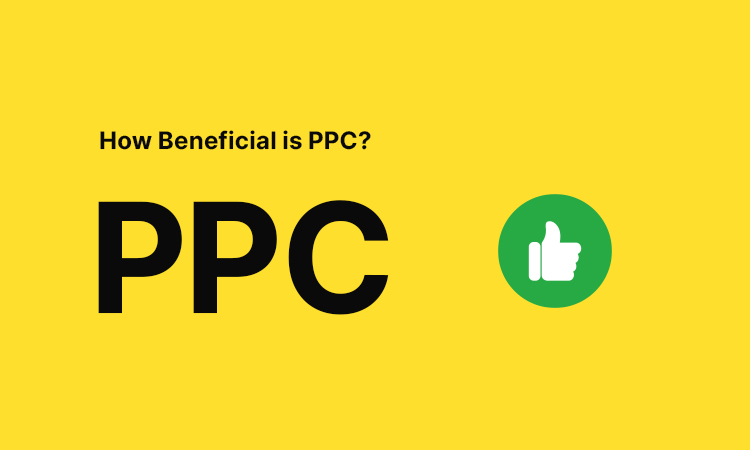
Pay Per Click is no doubt a very effective approach to online marketing. However, this is not enough to judge PPC as it has a long list of perks too.
So, here is a list of benefits which PPC assures to bring:
- Reaching Potential Customers Widely
The secret to strengthen your online presence is to allure your potential customers. No matter what, unless you direct them towards your business, you will lag behind. Through PPC ads, it becomes easier for you to connect them from your preferred locations and other corners of the world.
- Targeted Advertising
In contrast to SEO, PPC lets you reach the top search results in quick time. You don’t have to wait for months for the desired results. Most importantly, the algorithm changes do not impact the PPC ads.
- PPC is within Measure
In the world of digital marketing, PPC is any day measurable. On taking help of tools like Google Analytics, one can view the number of clicks and real time conversions. This gives you an idea of how you can manage your budget in sync with your ROI.
- Advertising through PPC is Cost-Effective
A conventional ad strategy will always cost more than PPC advertising. Just when one clicks on an ad, the advertiser has to pay for that only. In this way, one will find it easier to set a budget for his PPC campaign.
- Brand Visibility
What’s excellent about a PPC campaign is it targets your main keyword and help your website appear on the search engine result page. As a result, you let your audience notice you before they can scroll to check other results. In this way, your brand gets more visible, making your service stand out from others.
Drawbacks of PPC
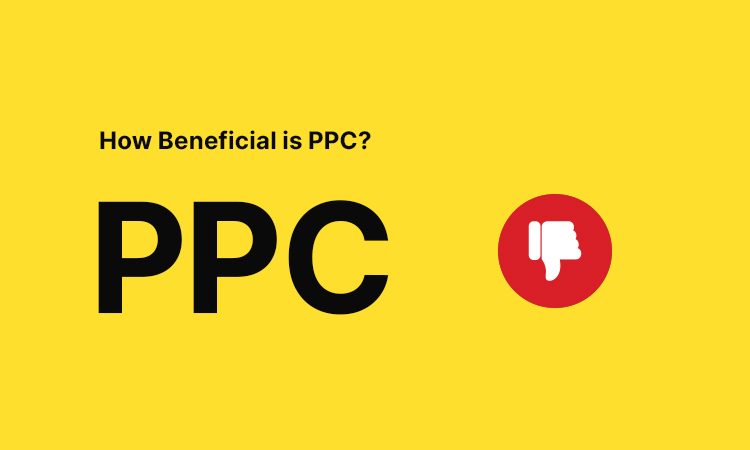
Just like SEO, there are disadvantages of using PPC. Before someone goes ahead to invest into it, here are two of the most challenging aspects about it:
- High Costs
PPC advertising can be a costly marketing strategy. To maintain effective campaigns, one might have to bear a high cost. Even when it comes to staying in the competition, PPC will include a huge financial investment.
- Temporary Results
It’s true that PPC advertising carries high chances to deliver temporary results. Unlike SEO, the PPC campaigns draw good traffic and visibility depending on how actively they are funded. When the ad campaigns come to an end, the instant flow of incoming visitors stops. Also, the visibility of the website is affected, resulting in poor ranking.
- Ad Blindness
A notable drawback in PPC advertising is ad blindness. It happens when users ignore any sort of ad, mistakenly or consciously. Since users acquire the habit to come across ads on websites while browsing, they tend to overlook these promotional ads. This results into lower CTR and poorer campaigns.
- Click “Fraud”
A significant disadvantage of PPC ads is dealing with the consequence of click fraud. This takes place when individuals click on ads with a harmful intention to inject malware or initiate a fraudulent activity.
SEO vs. PPC: Which One is Better for Your Business?
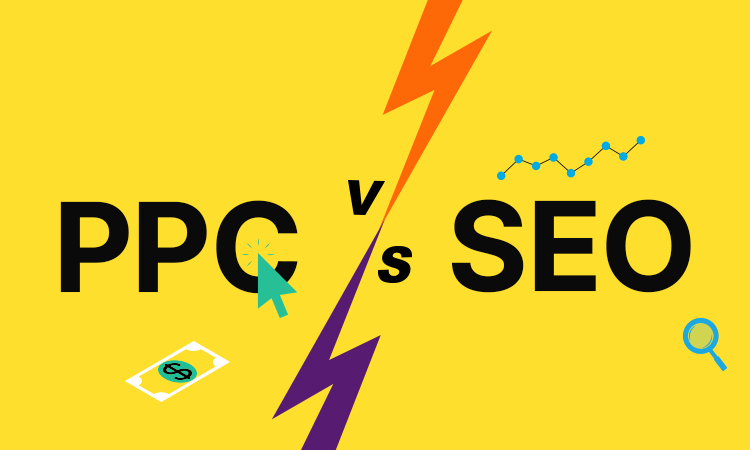
There are some questions that do not have easy answers. Similarly, when people judge between SEO and PPC, the answers come differently. Well, the most practical answer to this question is that it depends on multiple factors.
Where SEO helps content to rank higher on search engines, PPC demands spending money to bring your content for your target audience. However, there are several instances where PPC can score better than SEO, and vice versa.
Secondly, the debate between SEO and PPC is still among the popular ones in the world of digital marketing. Usually, a business goes for any one of these services.
However, experts say that the use of the right tools and timely strategies can promise to bring positive reports. When a company utilizes both these strategies, they hold the ability to perform in multiple channels.
| Factor of Specialization | Search Engine Optimization (SEO) | Pay Per Click (PPC) |
| Purpose | Ranks a website higher in search engine result pages for visibility | Posts paid ads on search engines for instant traffic |
| Investment | Time-consuming investment with ascending ROI | Instant investment with immediate ROI |
| Presence | Organic and appears below sponsored ads on SERPs | Instant visibility through sponsored ads mostly at top of SERPs |
| Time of result | Ranges from approximately 3 months to 1 year | Instant results with discontinuation of traffic after campaign ends |
| Target | Depends on quality and importance of content along with other SEO aspects | Depends on keywords, demographics, and other aspects |
| Click rate | Apart from SEO services, there is no cost per click | A fee is paid by the advertizer everytime his ad gets a click |
Similarity Between SEO and PPC
Although SEO and PPC are two different digital marketing strategies to optimize one’s digital presence, they share similarities too. Here are two crucial ones to note:
- Bringing Quality Traffic to Web Pages
Both intend to fetch quality traffic to your website. Those who use both these tricks will find it easier to allure heavy traffic.
- Targeting Keywords for Better Results
Both are keyword-based strategies. These aim at targeting specific keywords with the objective to attract a specific set of audience.
FAQs
For any business to flourish, what’s important is exposure. SEO is that perfect strategy that does a fantastic job in bringing your website on top of the search engine results. As it involves a variety of action-packed activities, they collectively contribute towards making your online presence stronger. Through keyword research, On-page SEO, Off-page SEO, technical SEO, and more, your hiring experts bring your business website to your target audience, making it known among all.
An SEO strategy always works in tune with what a business or organization wants. It’s the target audience that matters, and accordingly, the keyword research is done. It always concerns what the users want from your business. Accordingly, contents are written to inform people more about you and your services. These contents undergo an extensive marketing process to bring you the exposure. Professionals carry out these strategies in the most efficient manner.
PPC or Pay Per Click marketing is the most advanced and effective way to lend your business an online presence. This marketing strategy demands the advertiser to pay every time visitors click on his ads. Unlike SEO, it is not time-consuming and instead, drives good traffic in lesser time. PPC ads can run in multiple platforms for bringing better exposure to business.
Yes, you can always blend SEO and PPC simultaneously for your business. In fact, the results are going to be better and quicker on blending both the strategies together. With this duo, you can get both organic traffic and genuine visitors as well.
SEO takes longer to show good results than PPC. The time interval is 3 to 6 months in case of SEO while PPC promises instant results. Although both are result-oriented, SEO costs less and takes more time while PPC costs more and takes less time.
Final Thoughts
The debate between PPC and SEO will never take a break. Rather, an era is approaching when the majority of business organizations will want these tactics together at the same time. Although SEO deals with long-term benefits while PPC brings immediate visibility, both would work together to lift one’s digital reputation by a few notches. Moreover, both these strategies assure a higher ROI. Therefore, as long as you proceed with this deadly combination alongside professional help, nothing can stop you from taking your website reputation sky high.

